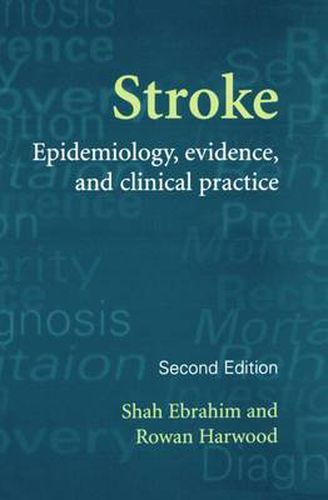Readings Newsletter
Become a Readings Member to make your shopping experience even easier.
Sign in or sign up for free!
You’re not far away from qualifying for FREE standard shipping within Australia
You’ve qualified for FREE standard shipping within Australia
The cart is loading…






Almost a decade has passed since the first edition of this book was published and the explosion of new research in stroke is very apparent. Several important themes have coloured medicine during this time: the development of evidence based health care, new optimism for acute drug treatments for stroke, the growth of new information about the human genome, a dramatic increase in the number of stroke clinicians and researchers world-wide, and the establishment of the Cochrane Collaboration.
All of these trends are relevant in revising a book of this nature. Clinical epidemiology remains an essential foundation for the practice of evidence-based healthcare. The enthusiasm of the pharmaceutical industry has resulted in a large number of new trials, often too small to detect clinically important differences, and have increased the number of clinicians actively engaged in stroke research. It is even more important that these clinicians should have a good understanding of the design of trials, the rationale for randomisation and blinding, and the importance of selecting the most appropriate outcomes. Surprisingly, little of practical importance has resulted from the decade of exploration of the human genome - the best indication of a person’s risk remains their phenotype and not their genotype. The impetus to organise stroke medicine into a defined speciality, with emphasis on acute stroke, is even stronger - but it is essential to bear in mind the importance of interdisciplinary working, the value of primary care, geriatric medicine, psychiatry and rehabilitation in the prevention, treatment rehabilitation and long-term care of stroke patients. The Cochrane Collaboration is currently grappling with a task of enormous size - the compression of tens of thousands of randomised control trials -and other scientific evidence- into systematic reviews of the effects of interventions. Citations to this work are made in the section on management. In this edition, there is an extra opening section entitled Epidemiology which comprises the nuts and bolts of the subject and reviews the purposes of health care for stroke patients. The remaining sections follow the format of the first edition: Diagnosis, Management, and Prognosis. All chapters have been substantially updated. The book retains its focus on epidemiology that is relevant to the clinician and attempts to use examples from stroke to illustrate many aspects of epidemiological thinking. The book aims to stimulate readers to think about their own practice, the nature of scientific evidence and the vast areas of clinical uncertainty that remain the target for research over the coming decades.
$9.00 standard shipping within Australia
FREE standard shipping within Australia for orders over $100.00
Express & International shipping calculated at checkout
Almost a decade has passed since the first edition of this book was published and the explosion of new research in stroke is very apparent. Several important themes have coloured medicine during this time: the development of evidence based health care, new optimism for acute drug treatments for stroke, the growth of new information about the human genome, a dramatic increase in the number of stroke clinicians and researchers world-wide, and the establishment of the Cochrane Collaboration.
All of these trends are relevant in revising a book of this nature. Clinical epidemiology remains an essential foundation for the practice of evidence-based healthcare. The enthusiasm of the pharmaceutical industry has resulted in a large number of new trials, often too small to detect clinically important differences, and have increased the number of clinicians actively engaged in stroke research. It is even more important that these clinicians should have a good understanding of the design of trials, the rationale for randomisation and blinding, and the importance of selecting the most appropriate outcomes. Surprisingly, little of practical importance has resulted from the decade of exploration of the human genome - the best indication of a person’s risk remains their phenotype and not their genotype. The impetus to organise stroke medicine into a defined speciality, with emphasis on acute stroke, is even stronger - but it is essential to bear in mind the importance of interdisciplinary working, the value of primary care, geriatric medicine, psychiatry and rehabilitation in the prevention, treatment rehabilitation and long-term care of stroke patients. The Cochrane Collaboration is currently grappling with a task of enormous size - the compression of tens of thousands of randomised control trials -and other scientific evidence- into systematic reviews of the effects of interventions. Citations to this work are made in the section on management. In this edition, there is an extra opening section entitled Epidemiology which comprises the nuts and bolts of the subject and reviews the purposes of health care for stroke patients. The remaining sections follow the format of the first edition: Diagnosis, Management, and Prognosis. All chapters have been substantially updated. The book retains its focus on epidemiology that is relevant to the clinician and attempts to use examples from stroke to illustrate many aspects of epidemiological thinking. The book aims to stimulate readers to think about their own practice, the nature of scientific evidence and the vast areas of clinical uncertainty that remain the target for research over the coming decades.